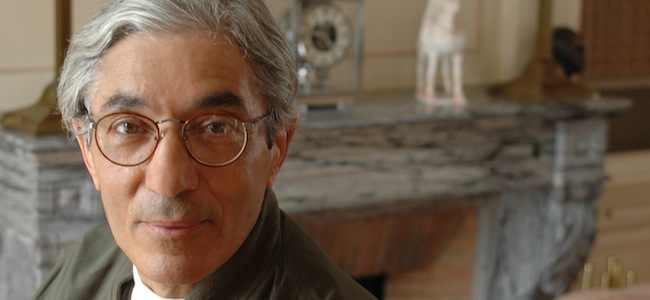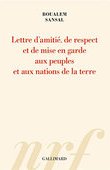I don’t want to review the whole history of censorship, we would have to go back to the Roman censors, the magis-trates whose absolute power meant their decisions couldn’t be appealed against, and who were meant to maintain moral standards in the City.

- © Hélie/Gallimard
We are familiar with censorship, we know the myriad of-ficial and unofficial ways censors have used over the cen-turies to muffle speech, and we know how the state pun-ished those who broke the law of silence. Each and every human institution – whether religious, civilian or military – has had a go, at all levels.
At some times, in some places, the system was so igno-minious that it has left a lasting imprint in human con-sciousness. Such totalitarian behaviour has left us words we still cringe at the sound of : inquisition, deportation, banishment, self-criticism, purge, gulag… Such words speak of death, of the arbitrariness and the suffering of our world. They make us truly uncomfortable.
Yet we also know how men and women, intellectuals, writers, journalists, film-makers, playwrights, have spo-ken up against censorship, putting their own lives at risk. That goes back a long way : from Socrates sentenced by the censors to drink hemlock to Galilei sentenced to life-long relegation. And the list goes on, up to Kravchenko whose film we have just watched and whose death is still mysterious (suicide or murder made to look like sui-cide ?). The list is full of prestigious names : Voltaire, Zola, Solzhenitsyn, Heinrich Heine, and so many others. It speaks of the courage and resilience of Man in the cause of freedom of speech, a freedom without which life is worthless.
But the world is not divided into two groups. The line be-tween censors and libertarians is uncertain : censors live amongst us, even within us. We all know that freedom of expression and its cause can be easy excuses for those who actually want to impose their truth and their censor-ship onto society. That is what extremists do. They speak up against censorship and want to impose their own, as Islamic fundamentalists – the latest addition to the dou-ble-speak scene – do. Someone like Tariq Ramadan is the greatest advocate of democracy and freedom of expres-sion in Paris, London and Geneva. We have to admit it even though we know his ulterior motives : to spread Is-lamic fundamentalism, democracy’s sworn enemy. Con-versely, ardent proponents of freedom of expression have, on occasion, approved of or even called for its re-striction. For instance, the Gayssot Act establishing the offense of denial of crimes against humanity does exactly that but draws on positive inspiration. In its introduction, it states that it introduces a ban not to violate freedom of expression but to oppose the virulent anti-Semitism of the Front National and of Holocaust deniers such as Robert Faurisson. Since then, Islamic fundamentalists have joined and even overtaken them. This goes to show that laws are only as effective as the resources made available to implement them. In this case, the resources are mini-mal. As we know, legislation, when not enforced, will support the trend, it becomes an incentive to do what it is meant to prevent and sanction.
For the radical anarchist that Noam Chomsky is, it is evil. He claims freedom of expression only makes sense if it is unfettered. He has therefore heavily criticised the Gayssot Act. It is easy to imagine what would happen if the law were repealed and if freedom of expression were unre-stricted, as Noam Chomsky, who has defended Faurisson, would want. There is a host of deniers and manipulators, they would soon get us to forget all the genocides com-mitted, against the Indians in America, against the Arme-nians in Turkey, against the Jews in Europe. We would forget about large-scale colonial massacres. They would try to convince us that slavery and colonisation were col-lateral damages in the forward march of history and civi-lisation. In fact, they have already tried. A law was passed here in France in 2005. Article 4 asked historians to high-light the positive aspects of colonisation. And article 13 extended the benefits enjoyed by those repatriated from Algeria to all OAS activists, including those convicted of terrorism and murder by French courts. This was going to lead to a comprehensive reworking of history and to a new form of censorship to gag all dissenters. Historians rebelled ; the revisionist provisions were withdrawn ; but those who put them forward are still sitting in Parliament expressing the same beliefs which, incidentally, are be-coming more popular.
It is all about democracy killing off democracy !
Significant voices, including Elisabeth Badinter, Marc Fer-ro and Alain Decaux, have called for the repeal of all re-strictive or prohibiting historical/memory laws, such as the Gayssot Act on revisionism, the Taubira Act on slav-ery, the act of 2005 on the Nation, and others. Should we do so ? It is a real issue.
The question is as old as censorship itself : Is prohibition or restriction always an act of censorship ? Orhan Pamuk – who probably shares Noam Chomsky’s views – was sen-tenced not for denying a historical truth widely accepted across the world and, probably, in Turkey too but for ac-knowledging it. In the Holocaust and the Armenian geno-cide, we have two crimes against humanity as the focus of two contradictory forms of censorship. In one case, who-ever denies genocide is condemned, in the other, whoever acknowledges it. Orhan Pamuk was condemned and re-viled at home but praised and honoured abroad. Those who deny the Holocaust in Europe are welcomed, listened to and honoured in many countries. In Iran, for instance, learned symposia are often organised at which people claim that their voice is muffled in Europe at the instiga-tion of the Jews and of Israel.
The questions of racism, xenophobia, homophobia, sex-ism, islamophobia and anti-Westernism are similar. Do we need a Gayssot-type potion for every ill ? Or do we need more freedom where there is already so much un-reasonableness, madness and ignorance and so little sound common sense ?
My introduction is self-explanatory. I would like us to look at this from a slightly different point of view as we open the debate on censorship. I feel we know enough about the way censorship operates, who fights it and who supports it but too often we overlook the basic issue of legitimacy. I mean the validity, or otherwise, of the rea-sons which, at a given moment, in a given country, lead the dominant classes – civilian, military, religious and fi-nancial – and other institutions whose purpose is to give meaning to society, such as universities, masonic organi-sations, learned society and the media, to state the truths and the way they should be observed, and to claim that straying from this would threaten public order. They have the power to direct, and possibly, force people. That should be enough, but no, they want everyone to share their philosophy and to support their domineering pro-ject. Anywhere the spirit of censorship takes root it spreads and becomes all-pervasive and prescriptive.
It may also be interesting to see how writers delegitimise censors’ arguments and legitimise their own. In truth, they have forgotten how to do it. Delegitimising Islamic fundamentalists by saying that they want to introduce sharia is stating the obvious : sharia is part of Islam, it is perfectly normal that Muslims should want to be gov-erned by the laws of their faith, just as democrats would want to be governed by the laws of the democracy they believe in. The same goes when saying that sharia is vio-lent. Capital punishment in the USA, China, Japan or else-where is no less violent. That, to me, is the reason why censorship lasts. We don’t always know how to delegiti-mise its bias and its claims. On the contrary, our argu-ments too often support it. To criticise the means without unpicking the underlying ideas is to support these very ideas.
It isn’t really a debate between advocates of opposed opinions but a vital struggle between two contradictory views of society.
Secrecy is part of human history. Some want to keep it un-touched and untouchable as it guarantees their power, and will do all they can to protect it. Others want to re-move it as it obstructs and keeps men ignorant and desti-tute.
Writers stand on the cusp, between these two worlds, the worlds of secrecy and transparency. They are not all look-ing in the same direction. Some denounce the censors. Many also denounce their victims and those who support them. In Paris, the global capital of human rights, left-wing intellectuals came and accused Kravchenko for de-nouncing Soviet totalitarianism. Are those who side with dictatorship sincere ? Do they truly believe that good can come from evil ? That some evils are worse than others ?
Looking at censorship from this point of view means look-ing at truth. What is truth ? Who holds it ? Who can con-firm that it is real and more useful to society than doubt, questioning or mistakes may be ? These are so many basic yet relative questions. Definitions are entirely different from one country to the next.
Censorship is no longer an official institution in demo-cratic countries. It is pervasive and enforced through leg-islation : anyone – public or private institution, voluntary organisation or individual – can turn to the courts to im-pose censorship on an article, a book, a film or a painting. They will mention defamation, infringement of privacy, breach of the peace, blasphemy, sexism, racism, anti-Semitism, homophobia, etc.
In a democratic environment, there is a double difficulty for writers active as defenders of freedom of expression. First, it is difficult for them to speak against censorship as they are talking of court rulings, handed down on the ba-sis of existing legislation, and against which it is always possible to appeal to a higher court. Second, confusion is such in society that speaking against censorship can be seen as supporting the action that gave rise to the initial complaint and the court case. When Charlie Hebdo print-ed the cartoons of Mohammed in support of the Danish Jyllandsposten, which was being threatened by Islamic fundamentalists, many accused it of islamophobia, blas-phemy, racism and the like. The fact is, defenders of free-dom almost always end up in the dock, and the censors are justified in their ways. It is a vicious circle.
Everywhere you turn you hear people saying, with des-pair in their voices : we can’t say anything about this or about that, about homosexuals, about Jews or Israel, about Muslims or Islam, about insecurity in the neigh-bourhoods. Censorship is so pervasive across democratic societies that speaking up will lead to criticism and re-proach or even physical violence and litigation. Ironically, silence has become a form of freedom. Saying nothing is saying it all but it is also depriving yourself of any action while the struggle for freedom requires, first and fore-most, a practical commitment.
To sum up, I feel the following questions should be exam-ined : How can we fight censorship ? How do we delegiti-mise its arguments ? And how do we convince society that the excesses of freedom will always be less serious than those of censorship ?
Boualem Sansal

